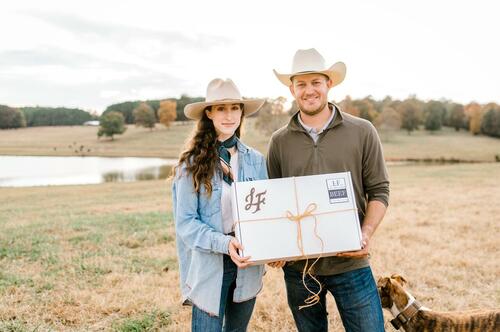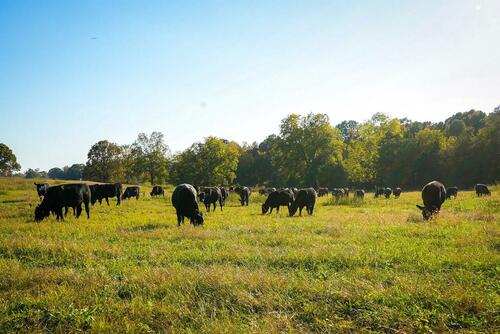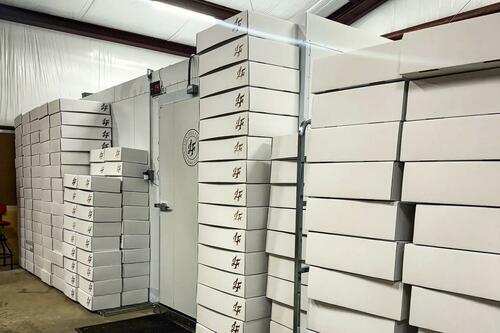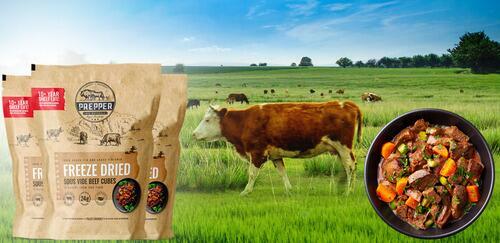Authored by Kevin Stocklin via The Epoch Times (emphasis ours),
At a time when thousands of America’s independent cattle farmers are going under each year, and herds falling to a 70-year low, one young couple believes they have found a way to save their family farm.

Livestock farming is now a far cry from what it once was, when ranchers would sell into competitive markets with prices based on quality, as well as prevailing supply and demand.
Today, four global meatpacking corporations—U.S.-based Cargill and Tyson Foods, and Brazilian-based JBS and National Beef/Marfrig—together buy 85 percent of all cattle in the United States, and many once-independent ranchers have devolved into contract labor for these companies, often selling at prices that don’t cover their costs.
The result has been an aggregate loss of 655,000 cattle farms since 1980, with an average of 20,000 ranches going under per year in America over the past five years.
After years of losing money under this system, however, Avery and Marc Wrigglesworth, owners of Lily Hill Farm in West Point, Georgia, decided to take a different path. The only way to survive, they said, was to build their own market that sells directly to customers.
While Avery grew up on the Georgia farm, Marc was raised on Jersey, a small island in the English Channel. They met in Jersey where they both were working office jobs in the finance industry.
In 2019, Avery was told by her father that the family’s farm, originally founded by her grandfather after he returned home to Georgia from a POW camp in Germany after World War II, would be sold. The herd had been sold off, down to 80 cattle, in order to pay debts, and the farm had fallen into what Marc calls a “death spiral.”
What was left was no longer able to generate enough income to keep the business going. Avery and Marc decided to quit their jobs and move to Georgia, hoping that the farm could be saved.
“We are now the third generation, and there’s always been something that’s drawn me to this place,” Avery told The Epoch Times. “It would have broken my heart to see it parceled up, and houses and subdivisions built all over it.
“I just felt like it needed to have one last chance to see if we could turn it around.”

They soon realized that the farm could not survive the way it was being operated.
“We were just selling the calf crop at the local stockyards—that’s generally how these cow-calf operations sell,” Marc said. But they weren’t getting enough from the processors to pay their expenses, and they had to find another way.
They decided, rather than selling to the big packing companies, to try selling directly to customers.
“It was a leap of faith, but we had no other option,” Avery said. “In the three years we’d been running this place, we had a net operating loss of nearly $600,000, so it was either pack it in and leave with our tail between our legs, or take an even bigger leap and see if this will work.”
They used their social media skills to build a base of customers, but making the switch cost them both time and money, depleting their savings.
“We just had to bite the bullet and keep everything back for two years with no farm revenue,” Marc said.
Avery had already built up a following on Instagram, so they had the beginnings of a customer base. During the two years of transition, they designed their online store and expanded their following, and Avery sharpened her photography skills for a steady stream of online posts.
They found a company in Alabama that would do the meat processing for them. Once processed, the beef is returned to them, stored in a walk-in freezer on their farm, and shipped out to customers via UPS, packed in dry ice.

Two years ago, the Lily Hill Farm’s website and online store went live, selling beef directly to customers that is pasture-raised “without additional growth hormones, antibiotics, or animal by-products,” the website states. And through their social media sites, Avery and Marc work to establish personal connections with customers.
“They want to know where their products are coming from,” Avery said. “They want to know it’s a family behind it, and they want to know the people and the story behind the products they’re purchasing.”
After years in the red, this new business model has returned the farm to profitability.
“When we launched in April of 2022, we hit the ground running, and it’s been unstoppable ever since,” Marc said.
Read the rest here...
